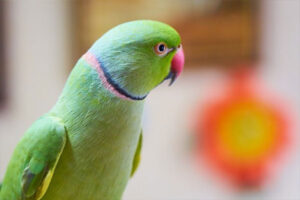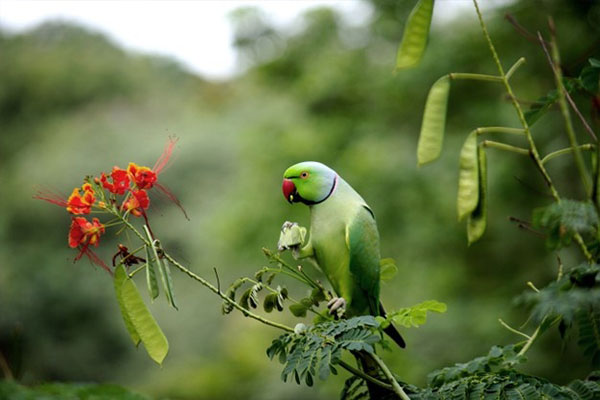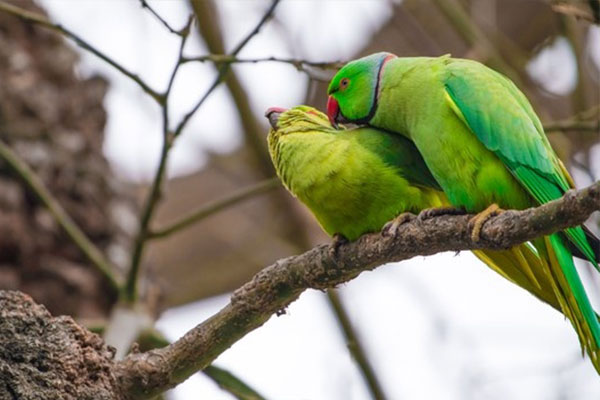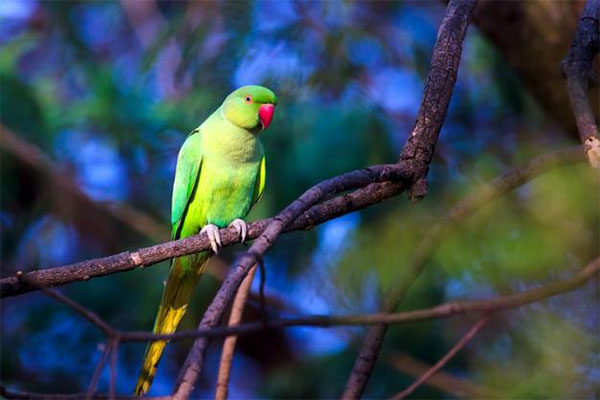
One of the most beautiful domestic birds, that many people are interested in keeping is the Rose-ringed parakeet, and this bird is also known as the green parrot or the pink-collar parrot. The average longevity of Rose-ringed parakeet is about 25 to 30 and their size is 35 to 40 cm, and in ideal living conditions, they may experience longer life. Rose-ringed parakeet have several different subspecies, most of which are found in Asian countries and Africa.
Pink-collar parrots are very popular in India, and from the past to the present, Indian families have shown great interest in keeping these parrots in their homes. Ever since the Rose ringed parakeet was discovered to speak, The Indians classified the bird as a sacred bird and decided to breed him. Of course, the Pink-collar parrot does not have the power to speak, but he has a good talent for imitating sound and singing. It is nicknamed the Talented Parrot because of its playfulness and need for long training.
stay with cotwer:

Recognize the sex of a Rose-ringed parakeet
Rose-ringed parakeets are found in nature in a variety of colors such as green, blue and bright yellow. But the most common color of this breed is Green Yellow. Male and female Rose ringed parakeet can be distinguished by the color of their beaks and necks; Rose-ringed parakeet have dark red bill and dark stripes on their necks, while females of this breed do not have colored neck lines and on their face, unlike males, there are no black spots.
Important Hints when keeping a Rose-ringed parakeet at home
Before buying a Rose-ringed parakeet, it is better to know that this parrot is not a quiet bird and has a lot of energy. It takes a lot of time to teach words to the Rose-ringed parakeet, and you should practice with him regularly every day.

Rose-ringed Intelligence
The Rose-ringed parakeet is very intelligent and may exhibit behaviors that you think are untouchable. But in fact, this bird is very active and if it is repeated continuously, it will feel very tired. If the bird is tired, it chews on things and sometimes becomes aggressive. These events often occur during puberty and will resolve over time. With the right training and time, you will be able to train your parrot and enjoy his beautiful voice.
Rose-ringed parakee size
The Rose-ringed parakeet may not be large, but their long tails require large storage spaces. When you decide to keep this parrot, you should prepare a large cage so that it can move easily in it and not get caught in a small space despite its long tail. The distance between the bars of the cage should be such that the bird cannot cross it because if he plays fully thinks of escaping from the cage, he may get caught between the bars. Do not keep the Rose-ringed parakeet in a cage all the time and leave the cage open for a few hours a day so that he can fly around the house.

Train and play with Rose-ringed parakeet
The playfulness of the Rose-ringed parakeet requires that you spend enough time talking and playing with him. This bird needs a lot of Kindness, Due to his clever, he can learn anything. Daily, clean the water and food containers of the Rose-ringed parakeet so that pollution does not exist and there is no problem in his health. Remove other items in the cage once a month and put them back in the cage after cleaning.
Rose-ringed food
The Rose-ringed parakeet, like any other pet, needs a complete and healthy diet to ensure his health. The body of these parrots needs vegetables, fruits, seeds, beans, cereals, rice and almonds, and besides them, you can use bird food to provide all the materials needed by the parrot’s body.
Do not punish the parrot
If you see aggressive behavior from your parrot, do not raise your voice and try to correct that behavior with the correct sequential methods. Aggression is a natural behavior during puberty, and if you keep this bird at home from the beginning, you can have more control over your pet’s behavior.
I am sorry, it not absolutely approaches me. Who else, what can prompt?
I did not fully understand your question!